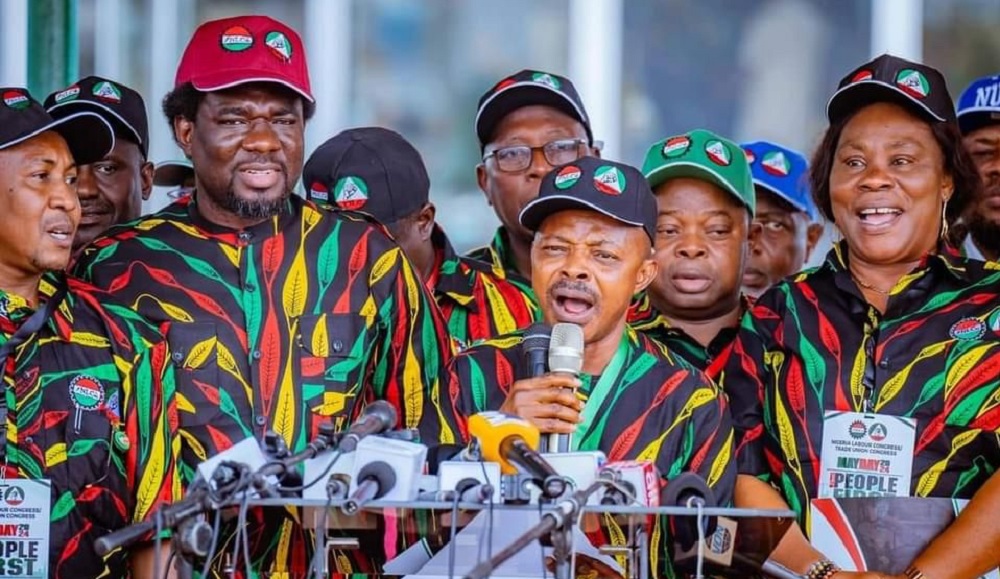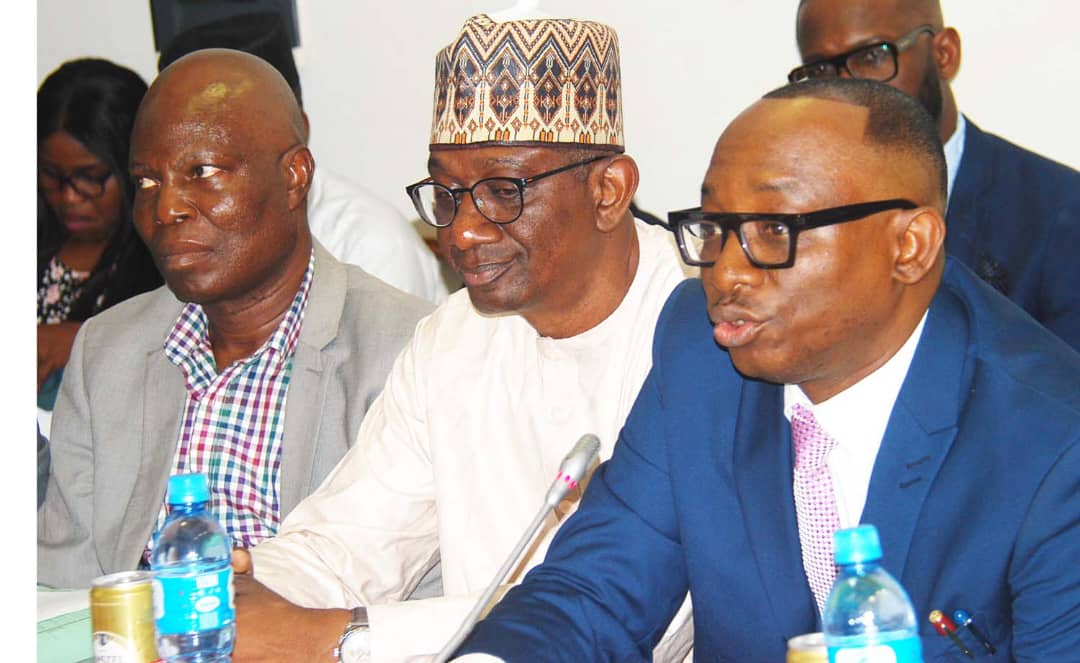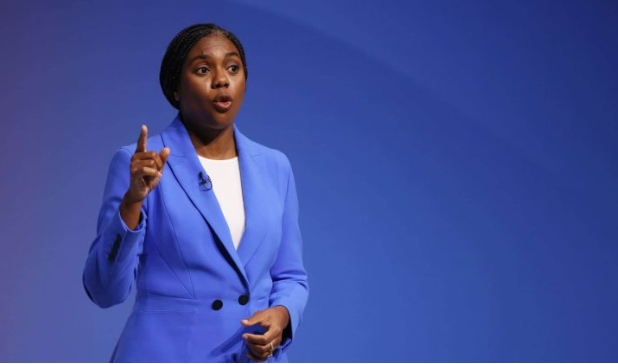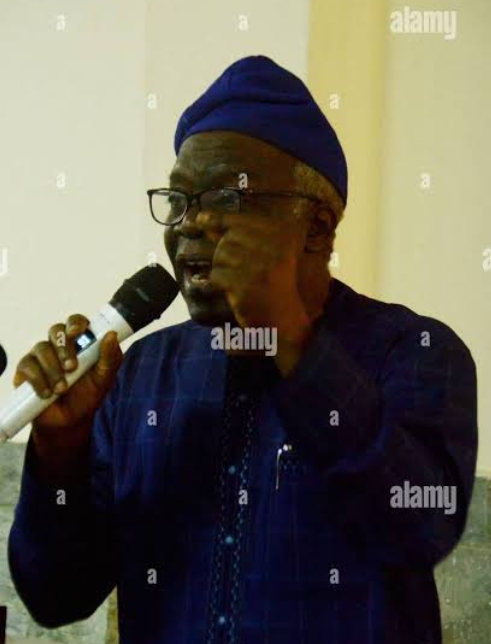News
Just in: Strike looming over fuel price increase

The Nigeria Labour Congress is set to hold National Executive Council meeting following the increment in the pump price of Premium Motor Spirit, otherwise called petrol.
The Nigerian National Petroleum Company Limited (NNPCL) had raised the pump price of fuel from N897 per litre to N1,030 in Abuja; from N855 to N998 in Lagos; N1,070 in North-East; N1,025 in other South-West states; N1,045 in South-East; and N1,075 in South-South.
This decision has led to widespread criticism from Nigerians, who have urged President Bola Tinubu to reverse the price increase.
However, in an interview with Arise Television on Friday, NLC President, Comrade Joe Ajaero, said the Congress executives will meet on the issue latest by next week.
He said; “Every organization has their modus operandi, and at no time will NLC President have the right or powers to say there will be strike tomorrow.
“Now, we have our own initial and administrative processes of conveying a meeting at the nearest possible time where decision on the next line of action will be taken.
“No NLC president will come out and say, we are going to start strike tomorrow or next, tomorrow without the organs meeting in most instances, either the CWC or the NEC, so we are following that process. Okay.
“Latest next week we should be able to meet and have conversation around this, so that the personal view of the leader, you know, does not be cloud, the position of the of the members.”
News
How BPP Saved Nigeria N1.9 Trillion in 15 Years – DG

By Gloria Ikibah
The Bureau of Public Procurement (BPP) has revealed that it saved Nigeria a total of N1.9 trillion by reviewing procurement processes and verifying contract sums from 2009 to 2023.
The Director-General, Dr. Adebowale Adedokun, stated during a budget defense session with the House of Representatives Committee on Public Procurement on Monday in Abuja.
He said that beyond the direct savings, the bureau’s compliance mechanisms have also played a role in boosting revenue by ensuring bidders are up-to-date on their tax, pension, and social security payments before participating in any procurement process.
However, the Director-General expressed concern over the budgetary ceiling imposed on the agency, which he feared could undermine this and other strategies designed to enhance the system.
During the budget planning process, the Bureau requested N72,775,250,713, but the Budget Office allocated only N3,283,021,838, excluding the Personnel budget of N649,558,451.59.
Regarding the 2024 budget performance, he noted that N2,234,785,641 was allocated, with N2,110,061,164 utilized. However, the capital allocation of N289,418,688 was insufficient to achieve significant reforms or address the core mandates needed for effective contract administration. So far, only N184,024,690 of the capital expenditure allocation has been released.
For the 2025 budget, Adedokun highlighted the agency’s focus on addressing office accommodation needs, improving project monitoring and evaluation across the country, implementing an electronic procurement system, and enhancing capacity building.
While thanking the Committee for its continued support, he appealed for additional funding to help the Bureau meet its objectives.
News
Presidency Slams Kemi Badenoch’s Insultive Remarks About Nigeria

By Kayode Sanni-Arewa
The administration of President Bola Ahmed Tinubu has called on the United Kingdom’s Conservative Party leader, Kemi Badenoch, to stop making disparaging remarks about Nigeria.
The Nigerian-born politician, sparked controversy in 2024 following repeated critical comments about her country of birth.
In her first address of the year at an event hosted by Onward, a British think tank focused on economic and social issues, Badenoch criticized Nigeria’s governance. She stated she did not want Britain to mirror what she described as Nigeria’s “terrible government,” which, in her words, “destroys lives.”
Emphasizing the need for reform and trust-building in governance, Badenoch argued that the Conservative Party was the right choice to steer the UK away from such pitfalls. She warned that without significant changes, Britain could risk adopting systemic flaws similar to those she attributed to Nigeria.
The remarks prompted a response from Daniel Bwala, the Special Adviser to President Tinubu on Policy Communications. In a post on X (formerly Twitter), Bwala urged Badenoch to avoid using Nigeria as a rhetorical tool to gain favor with her political base.
“I truly wish that sister Kemi Badenoch would avoid denigrating Nigeria, the country of her origin, as a weapon to please her far-right base,” Bwala wrote. He drew a parallel with UK Prime Minister Rishi Sunak, noting that Sunak had never criticized India, his ancestral home, to gain political advantage.
Bwala praised Badenoch’s intelligence and political accomplishments but expressed disappointment over her negative rhetoric about Nigeria. “She is smart, intelligent, and we are proud of her rise in UK politics, but we are equally saddened by her terrible rhetoric against Nigeria,” he added.
This development underscores ongoing tensions surrounding the portrayal of Nigeria on international platforms, particularly by individuals with ties to the country. It raises broader questions about the balance between constructive criticism and national pride in political discourse.
News
BREAKING: Falana Declares INEC Should Stop Conducting By-Elections

By Kayode Sanni-Arewa
Constitutional lawyer, Femi Falana (SAN), has called on the Independent National Electoral Commission (INEC), to stop conducting by-elections in the country as such by-elections only lead to unnecessary and wasteful spending of funds.
Falana who made the call in a statement on Sunday, argued that since votes recorded during elections belong to political parties, the replacement of elected candidates as a result of death or resignation should not call for a by-election. “The political parties that sponsored the candidates that die or resign should be directed to fill the vacancy by nominating another candidate,” the lawyer said. He also urged the National Assembly to amend the electoral act to allow parties to replace elected officers without resorting to by-elections.
“The National Assembly should therefore amend the Electoral Act to allow political parties to replace elected public officers who lose their positions as a result of death, resignation or impeachment.
By virtue of Section 221 of the Nigerian Constitution, elections are won by political parties and not by candidates. “In the case of Amaechi vs. INEC & Ors (2 008) LCN/3642 (SC), the Supreme Court held that “The above provision (i.e.Section 221) effectually removes the possibility of independent candidacy in our elections, and places emphasis and responsibility in elections on political parties. Without a political party, a candidate cannot contest
“In his own contribution to the judgment, Pius Olayiwola Aderemi JSC (of blessed memory) emphatically stated that “…it is the political parties that the electorates do vote for at election time. “In P D.P. v. I.N.E.C. (1999)7SC (PT II) 30, Mr. Boni Haruna was allowed to be the governor of Adamawa State following the resignation of the elected governor, Mr Atiku Abubakar, who had been nominated as Vice Presidential candidate of the Peoples Democratic Party. “For some inexplicable reasons, the Independent National Electoral Commission changed the law when it decided to conduct an additional election after the death of Mr. Audu Abubakar who had emerged the Governor of Kogi State,” he said.
-

 News23 hours ago
News23 hours agoReps Direct Ministry of Health to Provide Detailed Report on Nutrition Interventions Amid Malnutrition Crisis
-

 News18 hours ago
News18 hours agoAlleged medical trip: Wike reacts, says I’m fit and very healthy
-

 Metro17 hours ago
Metro17 hours agoSAD! Police nab man for allegedly st3bbing in-law to d#ath
-

 News17 hours ago
News17 hours agoPolytechnic Workers To Begin Warning Strike Wednesday
-

 News17 hours ago
News17 hours agoNiMet to unveil 2025 seasonal climate prediction February 4
-

 Economy17 hours ago
Economy17 hours agoTikTok restores service in US after Trump pledge
-

 News17 hours ago
News17 hours agoObasanjo, Buhari, Fashola Testify in Paris Over $6 Billion Mambilla Power Project Arbitration
-

 News17 hours ago
News17 hours agoHe died in active service -EFCC opens up on slain operative








